 Norway - Full Moon 173 - 10/23/10
Norway - Full Moon 173 - 10/23/10
It's a label showdown!
Metronomicon Audio vs. Jester Records - Round 16
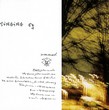
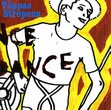 Täppans Strepens: Dance, Dance Decadance
Täppans Strepens: Dance, Dance Decadance
(2003 Metronomicon Audio: MEAU.0016.CDR)
vs.
Ulver: Silencing the Singing
(2001 Jester Records TRICK-016)
Welcome to round 16 in the label showdown series between Metronomicon Audio and Jester Records!
Since we've more or less totally missed out on reviewing the output of these two great labels, we are going
through their entire catalogues, matching the releases from each label consecutively against each other.
Humorously counting goals and giving out yellow
and giving out yellow and red
and red cards, soccer style -
but first of all reviewing the music. For more introductory information on this label match, see
round 1. cards, soccer style -
but first of all reviewing the music. For more introductory information on this label match, see
round 1.
Match preview
Dance, Dance Decadance comes in a jewel case with a folded insert with art.
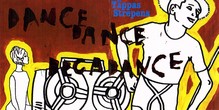
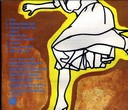
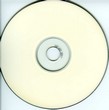

The Ulver release comes in a jewel case and a folded insert with art and info.

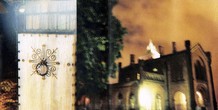
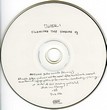

The match
We know from earlier output that Täppas Strepens is into american folk music and poetry. The opening track here,
simply called "Intro", goes straight to the point, with what I presume is Woody Guthrie speaking to us in his dry voice, telling
us which songs are good and which are bad for you . We described Strepens last album as "a fine collection of low-key guitar-strumming folk songs with socially aware lyrics",
so I guess it is fair to assume that Guthrie is a mentor of his. . We described Strepens last album as "a fine collection of low-key guitar-strumming folk songs with socially aware lyrics",
so I guess it is fair to assume that Guthrie is a mentor of his.
A little surprise then when the almost summer-breezy pop of "Making Human Junk" takes over, dominated by keyboards.
But with "Journey Towards The Subject" it's back to the guitar-strumming, and although there's nothing wrong with the song,
it sounds very similar to songs we'we heard before from Strepens. Some arpeggio keyboards is added for variation, but
can't obscure the fact that Strepens tend to reuse the same kind of melody lines in several of his songs .
The same could be said for the eco-aware "When The Sun Becomes A Monster", but here the arrangements take new turns,
first being lush and vibrating, but after a while distorted guitars hijacks the song, ending closer to a psychedelic rock sound
than anything previously produced by Metronomicon .
The same could be said for the eco-aware "When The Sun Becomes A Monster", but here the arrangements take new turns,
first being lush and vibrating, but after a while distorted guitars hijacks the song, ending closer to a psychedelic rock sound
than anything previously produced by Metronomicon . Well, it is ending with a banjo, but that's just a bridge to the next song,
"Oh Devil", which sounds like an american blues/folk traditional. Short, accompanied by mostly banjos, Strepens does some of his
best singing so far, the song sticking instantly . Well, it is ending with a banjo, but that's just a bridge to the next song,
"Oh Devil", which sounds like an american blues/folk traditional. Short, accompanied by mostly banjos, Strepens does some of his
best singing so far, the song sticking instantly .
Less memorable is "I Ain't Got No Home", where fiddles join in on a barn dance. Apart from the drumming, which sounds slightly
modern, this is the kind of melody that Strepens could come up with in two minutes and half asleep .
Less memorable is "I Ain't Got No Home", where fiddles join in on a barn dance. Apart from the drumming, which sounds slightly
modern, this is the kind of melody that Strepens could come up with in two minutes and half asleep . 10 seconds of genre switching
(to rock) towards the end also seem out of place. "Taming The Bull" takes another turn, this time towards melancholy pop.
A cheesy keyboard tries to stab the song on occasions . 10 seconds of genre switching
(to rock) towards the end also seem out of place. "Taming The Bull" takes another turn, this time towards melancholy pop.
A cheesy keyboard tries to stab the song on occasions , but luckily stays away from most of the refrain. The middle intermezzo
is too long, but Strepens and company seem more into having fun in the studio than repeating the refrain several times. Too bad,
because with a little more focus, this could have been a nice and hummable one. (The album ends with a short unlisted track, where
they humorously thank Daniel Bakken over hammond outro chords saying they are sorry for not mentioning his playing on the printed CD folder.) , but luckily stays away from most of the refrain. The middle intermezzo
is too long, but Strepens and company seem more into having fun in the studio than repeating the refrain several times. Too bad,
because with a little more focus, this could have been a nice and hummable one. (The album ends with a short unlisted track, where
they humorously thank Daniel Bakken over hammond outro chords saying they are sorry for not mentioning his playing on the printed CD folder.)
To sum it up: This is not a homogeneous collection of songs from Strepens, neither in style nor in quality.
Strepens and his crew play around in the studio, not always ending up with the best of ideas, but occasionally they succeed, taking a song to another level. Half of the songs
here are above OK, but with a little more focus, Strepens should be able to improve on this.
We're not many seconds into the first track before we can recognize Ulver's sound from their latest releases.
Consisting of three almost 10-minutes long tracks, that all share some of the same melancholy and glitchy core.
"Darling Didn't We Kill You?" starts off rather melodic, with keyboard chords and guitar chord runs that wouldn't
sound out of place on a Twin Peaks soundtrack , apart from the static electric/white noise and some short R2-D2 like voice fragments.
The guitar and keyboard/samples slowly grows more loopy, and percussion is added, creating a repetetive pattern, a frame for
other sounds to enter in and out of. What seemed like white noise at first, is revealed to be a synth tone, which starts shifting towards the end.
"Speak Dead Speaker" begins with what sounds like electric footsteps in a large verberated and wet hall, while fragments of
symphonic instruments occasionally leak through very small holes in the wall. After a couple of minutes all reverb is switched
off. A rather traditional synth chorus is introduced, while the use of reverb shifts back and forth from "hall" to "small room",
until the track ends with previously visited melodic patterns, this time played by a string quartet, which slowly is being infused by technology. , apart from the static electric/white noise and some short R2-D2 like voice fragments.
The guitar and keyboard/samples slowly grows more loopy, and percussion is added, creating a repetetive pattern, a frame for
other sounds to enter in and out of. What seemed like white noise at first, is revealed to be a synth tone, which starts shifting towards the end.
"Speak Dead Speaker" begins with what sounds like electric footsteps in a large verberated and wet hall, while fragments of
symphonic instruments occasionally leak through very small holes in the wall. After a couple of minutes all reverb is switched
off. A rather traditional synth chorus is introduced, while the use of reverb shifts back and forth from "hall" to "small room",
until the track ends with previously visited melodic patterns, this time played by a string quartet, which slowly is being infused by technology.
A church bell chimes in "Not Saved" and then introduces a church organ repeating a sad phrase over and over through the whole track,
sounding much like a funeral preludium. Familiar sound glitches blurs the experience, but the church bell re-enters
and dominates the rest of the track alongside the church organ. It almost becomes vulgar when what sounds like worms
or leeches feasting joins in, creating images of decomposing flesh . The occasional (and ending) bursts of white noise distortion
sounds like something being ripped apart. The unsaved souls perhaps? Jesus ... Well, any message
Ulver try to get through with "Not Saved" is simply overwhelmed by the emotional depth and strength of the
funeral experience, which I am sure most listeners will think of when listening to this track. And frankly, I expect more from Ulver than simply taking
a church bell and a church organ and adding experimental ambience and light noises . The occasional (and ending) bursts of white noise distortion
sounds like something being ripped apart. The unsaved souls perhaps? Jesus ... Well, any message
Ulver try to get through with "Not Saved" is simply overwhelmed by the emotional depth and strength of the
funeral experience, which I am sure most listeners will think of when listening to this track. And frankly, I expect more from Ulver than simply taking
a church bell and a church organ and adding experimental ambience and light noises . .
To sum it up: Silencing The Singing is falling somewhere between Perdition City and Silence Teaches You How To Sing,
and is not taking Ulver to a new level of creativity. The three long tracks are a relatively uneventful listenening experience,
apart from "Not Saved", which feels like a misfire. I labeled Ulver's last output soul-glitch, I guess this will have to be funeral-glitch.
Match result: Metronomicon Audio 3 (      ) - Jester Records 1 ( ) - Jester Records 1 (   ) )
Next match
Next head-to-head meeting is the Center Of The Universe CD Staying Up All Night With The C.O.U. from Metronomicon Audio which is up against the
Kåre João release Captain Trips from Jester Records.
Copyright © 2010 Knut Tore Breivik 
|

 Täppans Strepens: Dance, Dance Decadance
Täppans Strepens: Dance, Dance Decadance




